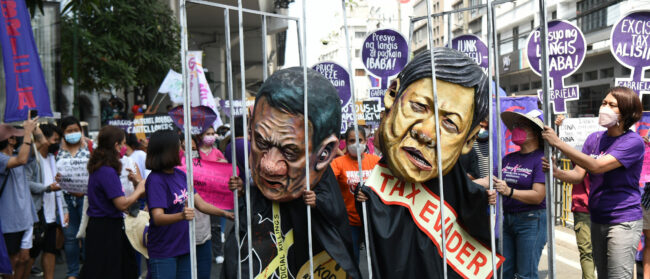The voice reached villagers first. Before the rallies and the speeches, before politicians made promises and voters cast ballots, Cambodians felt the potential for change in the songs of DJ Khla.
There was no more famous Cambodian rapper than DJ Khla, one of the few artists who spoke out against Prime Minister Hun Sen’s government during the 2013 national election period. The move was even more impactful – and dangerous – because DJ Khla had served in Hun Sen’s personal bodyguard unit.
In the authoritarian environment that has persisted in Cambodia, no singers with similar celebrity status have since followed DJ Khla’s path of political advocacy.
Gripping a mic and the steering wheel of his car, DJ Khla rapped his way across northwestern Banteay Meanchey province in 2013, campaigning for the Cambodia National Rescue Party (CNRP), the leading opposition group.
His Rs rolled like wind through rice paddies, the trills transforming the party’s platform into mesmerising riffs about equal opportunity and higher wages. He helped millions believe something beyond the inevitable might happen in the election.
The ruling Cambodian People’s Party (CPP), already in power for more than 20 years, expected to win easily. In an election where the CPP controlled everything from the military to ballot counting, the newly formed CNRP still managed to claim 44% of the popular vote.
The election result reflected a genuine desire for political change throughout the country. For a brief time, a critical mass of people spoke up for what they believed, even at the risk of their reputations, careers or lives.
“Back in 2013, people were really brave, they could come out publicly expressing their political support without consideration of retaliation,” said Chak Sopheap, director of the Cambodian Centre for Human Rights. “It was the point when the government believed they couldn’t let it go any more.”
The full blowback arrived with the 2017 election, when the CPP won every seat in national government after forcibly dissolving the CNRP, exiling and later prosecuting its leaders.
Even before then, DJ Khla paid for his convictions.
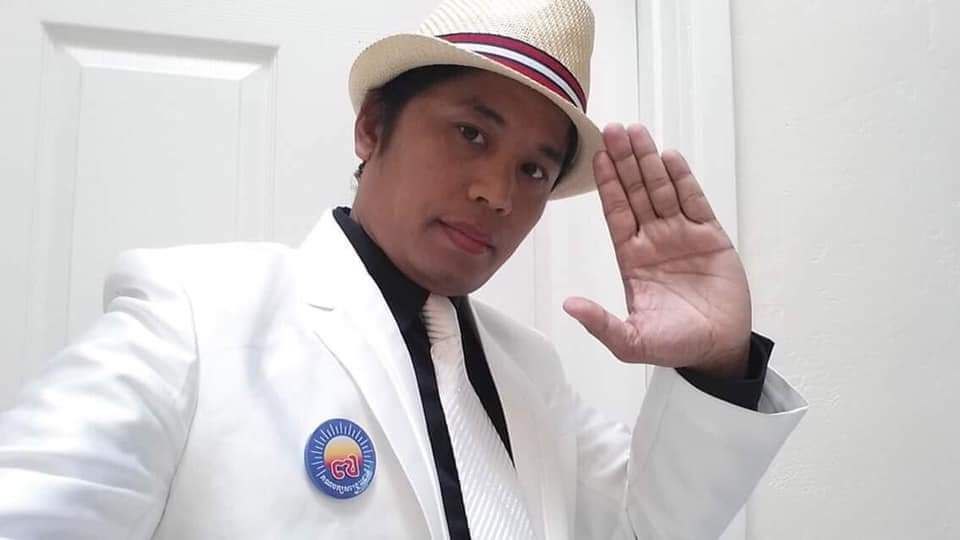
Growing up poor with only a fifth-grade education but a natural sense of rhythm, Nherm Phalla knew music would be his livelihood. He sang at beer gardens for meals and placed on a televised music contest in his early 20s. The aspiring rapper began performing at a restaurant for $70 a month, paying more than a quarter of his salary to the house keyboardist for lessons.
As DJ Khla, “DJ Tiger” in Khmer, Phalla crafted his 2012 breakout song, “Rambo,” combining the cadence of traditional Khmer vocals with reggae funk and rhymes about Cambodian life. The song became a sensation through wedding and restaurant performances, later reaching the radio.
DJ Khla’s voice held the ability to entertain and, the government believed, the power to indoctrinate. After “Rambo,” the rapper accepted an offer to promote the government as an artist in the prime minister’s bodyguard unit.
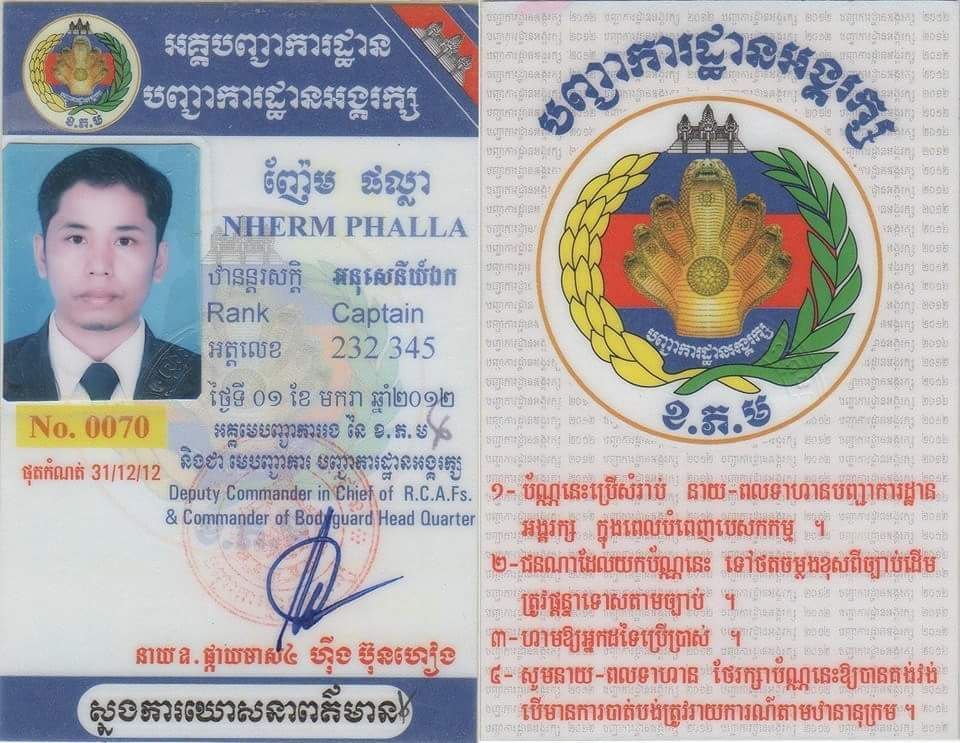
The unit arose in the 1990s during a United Nations effort to implement democracy in Cambodia as Hun Sen’s CPP vied for power with opposition leader Sam Rainsy and royalist factions. The CPP took decisive control in 1997, using armed force to remove the royalist FUNCINPEC party from a short-lived power-sharing arrangement.
As a prime minister with a growing list of enemies, Hun Sen expanded his personal security. Prior to the CPP coup, the bodyguard unit attained international notoriety for alleged involvement in a grenade attack at an opposition rally, which killed 16 people and injured more than 150. A quarter of a century passed before unit leaders Huy Piseth and Hing Bun Heang were indicted by a French court in March.
The bodyguard unit’s involvement in the attack was “100% conclusive,” according to Brad Adams, former director of Human Rights Watch Asia. He wrote that the unit was “synonymous in Cambodia with violence, corruption, and impunity, fully protected by Hun Sen as his de facto private army.”
With his uniform and gun, DJ Khla, the musician who once couldn’t afford a keyboard, finally had k’sai (string), Khmer slang for a connection to power.
I was hoping the political power would help protect me. But the party just used me for their own benefit, to promote themselves”
DJ Khla
He knew what it meant to live in Cambodia without influence. His community once pooled money to fund road repairs, but local CPP officials spent it on beer. DJ Khla believed party membership and bodyguard apparel would bring fear and respect.
In the video for his next hit song in 2012, “Mean Ch’ey,” DJ Khla pranced around in aviator shades and military uniform, brandishing a gun, as images of the CPP leadership flashed to an electronic pulse.
“It was totally unexpected to see a policeman come as a policeman, drop the gun, take the mic and start with some powerful reggae music,” said Marc Salvetti, who owned the popular Equinox club where the rapper performed.
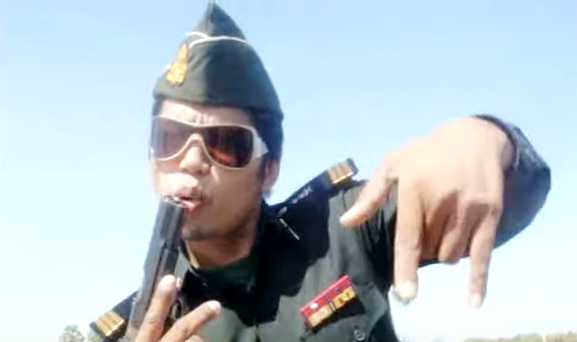
DJ Khla enjoyed supporting the soldiers, though he said he only received half his promised salary and performed independently to earn enough to survive.
Old feelings of powerlessness reemerged. A gas company operating unsafely endangered his neighbourhood. When the rapper complained, authorities ignored him.
“I realised the law cannot help me,” he said. “I was hoping the political power would help protect me. But the party just used me for their own benefit, to promote themselves. The less privileged people would still suffer from the injustices in society.”
Through the internet and foreign travel, he interacted with opposition-oriented diaspora groups and saw a bigger picture of violence, exploitation and corruption in Cambodian society, he said.
On the wrong end of the string, DJ Khla understood he was only a puppet.
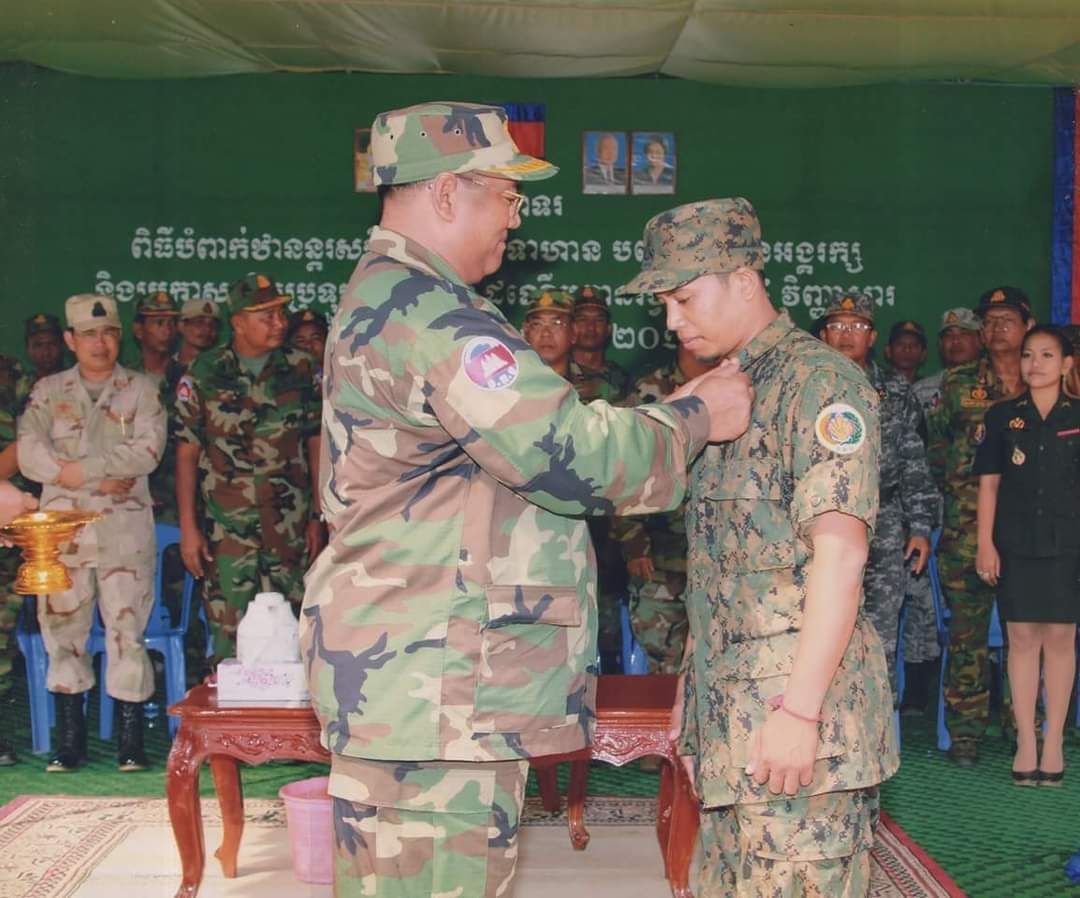
The CNRP formed in 2012 under two leaders, Rainsy and Kem Sokha, who united a previously split opposition. With a grassroots, social-media oriented campaign targeting young people, the party presented a compelling alternative to the patronage and intimidation many Cambodians associated with the ruling CPP.
One month before the 2013 election, the bodyguard unit’s celebrity resigned, replacing his uniform and gun with a white suit emblazoned with the CNRP’s rising sun symbol.
“In a democratic country, everyone has their own choices, they can decide which party is the best for them,” said Meach Sovannara, the former CNRP information director who recruited the musician. “What DJ Khla did inspired many others to take their own path, decide which party will contribute something good.”
DJ Khla campaigned directly for Sovannara, a CNRP candidate in Banteay Meanchey province. The rapper turned the opposition’s clunky “seven-point policy” – including free healthcare for the poor, a pension for the elderly and guaranteed agriculture prices – into a flow so smooth he had European heads bobbing at a Danish music festival when he performed the song.
Most people in Cambodia, they have CNRP in their heart”
CPP supporter Bun Sambath
Along with Sovannara and a ragtag team of volunteers, DJ Khla spent weeks travelling to every Banteay Meanchey commune, the administrative centres governing groups of villages. DJ Khla headlined the rallies, spinning satirical raps improvised from crowd comments, Sovannara recalled.
The energy was intoxicating: children raced along screaming “CNRP,” residents handed party volunteers water and snacks, farmers sang the opposition’s anthems in their fields.
The CNRP claimed the moral high ground against the CPP, but the opposition’s stump speeches and messaging also used nativist rhetoric railing against ethnic Vietnamese in Cambodia and perceived border land loss.
DJ Khla’s bandmates, including keyboardist and CPP supporter Bun Sambath, begged their star singer to tone down his politics. “Most people in Cambodia, they have CNRP in their heart,” Sambath said.
Former CNRP Member of Parliament Mu Sochua said there were many public servants, even top generals, who covertly supported the party without the courage to speak out. “The difference is between wanting to change and taking a step for change and, even more, going out loud,” Sochua said.
One week after DJ Khla resigned from the bodyguard unit to hit the campaign trail, a prominent military commander recognised his subordinate singing in a CNRP video. The general called, asking DJ Khla if he wanted to die.
Bodyguard unit members followed their renegade colleague. They searched his home, found his CNRP paraphernalia and told him he could accept $5,000 in cash to return to the unit or become a spy against the CNRP.
The rapper’s coveted string had become a noose.
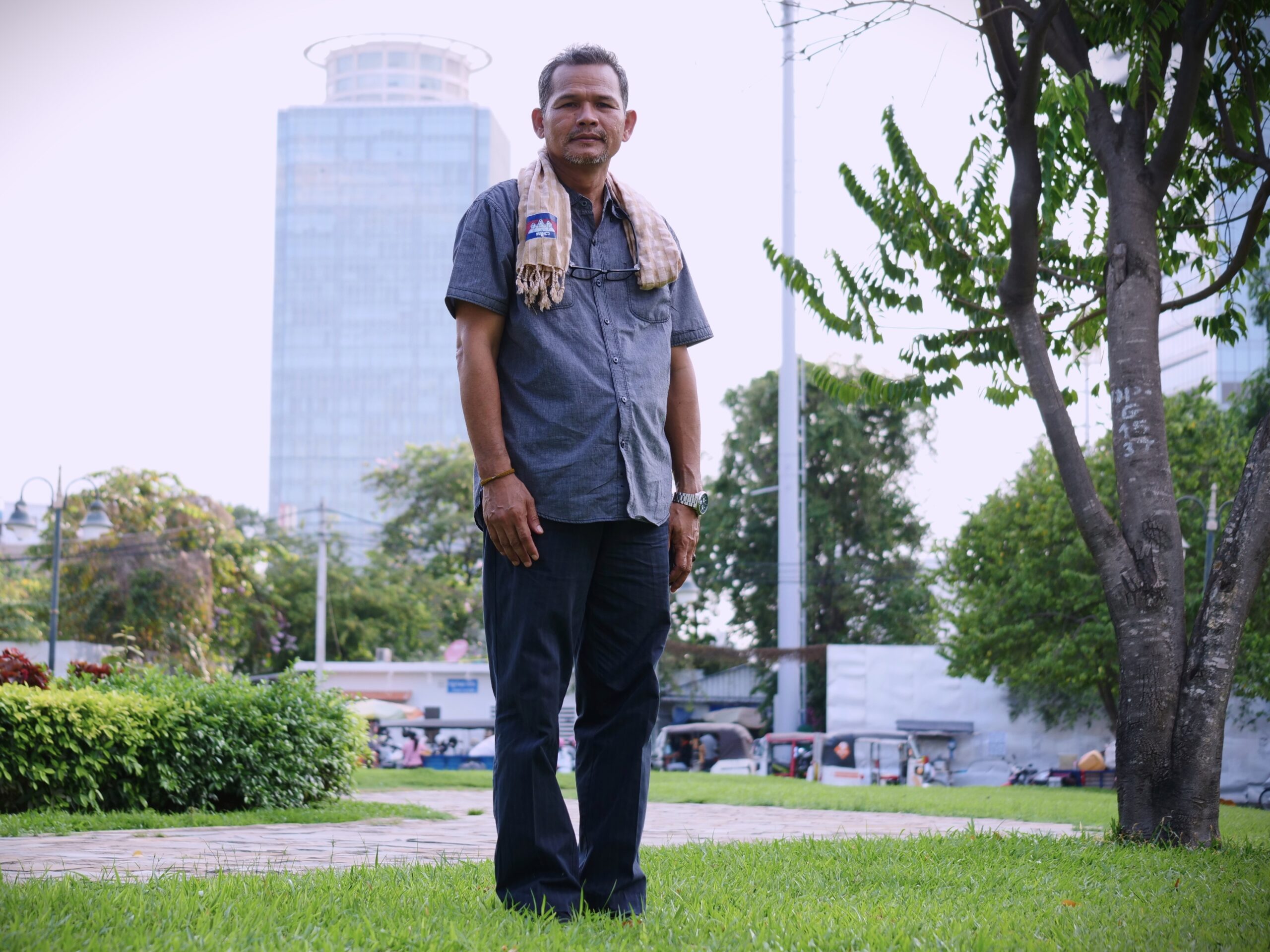
DJ Khla changed his phone number. He knew from the countryside rallies that the CNRP had real support. He expected to be safe after the election.
He was shocked when the CNRP lost, just as observers were stunned the election had been so competitive. The CNRP gained 2.9 million votes and dozens of parliamentary seats to the CPP’s 3.2 million votes. In 2008, the ruling party won by more than 2 million votes.
Despite the close result, there were “serious flaws” in the voting process, with hundreds of thousands of voters duplicated on registration rolls and potentially 1 million voters excluded, according to a report by the NGO Committee for Free and Fair Elections.
“There’s never been a level playing field,” said Adams, the former Human Rights Watch Asia director who explained the international community offered minimal supervision because of the election’s foregone conclusion.
Rainsy, the French-Cambodian CNRP leader who was allowed to return from exile the week before the election, immediately contested the outcome. Crowds poured into Freedom Park between the Tonle Sap River and central Phnom Penh. Opposition leaders spoke and supporters took the stage to speak unfiltered.
DJ Khla rapped at the rallies held nightly for months and recounted how the bodyguard unit had offered money and a promotion, threatening him after the gifts failed. Defiant in public, he was privately concerned as human rights groups warned he was in increasing danger.
“I already knew if I went back, it’s like going to death,” he recalled. “I betrayed them.”
The risks mounting, DJ Khla used a Denmark performance a few months after the 2013 election as an opportunity to seek asylum in France, leaving behind his wife and three children. His family fled to Thailand in 2016 and he saw them only three times before they were allowed to move to France in 2019.
DJ Khla’s bandmate Sambath accompanied him to Europe in 2013 before returning to Cambodia and launching a successful entertainment company, the kind of opportunity that might have been available to the rapper if not for his activism.
Performers must have “normal” songs and support the government, Sambath said. “That’s why I could come back to Cambodia and he could not.”
DJ Khla remained active in the Cambodian diaspora, performing across Europe, the U.S. and China after receiving aid from the French government and the CNRP.
“We never gave up on him, he never gave up on us,” Sochua said.
CNRP leaders including Sochua were exiled in the ruling party’s 2017 clampdown. Candidate and communications director Sovannara was sentenced to 20 years in prison in 2015, serving three before issuing a public apology and receiving a royal pardon. More than a hundred CNRP activists remain caught in a prolonged trial, mostly on charges of treason and incitement.
DJ Khla has not halted his activism, producing songs in support of the Candlelight Party, the new political home to many CNRP refugees. One title summarises the vision he shares with Candlelight members: “Morality, Truth, Justice, Social Justice.”
The momentum of 2013 is gone. In a small French town thousands of kilometres away, his songs receive thousands rather than millions of social media views. Like many of Cambodia’s prominent activists and symbols of resistance, he was forcibly removed from the public eye.
Yet he has not forgotten the reasons for cutting his string to unite with the opposition.
“I thought of my own future, my child’s future, my country’s future,” DJ Khla said. “All the people stood up together, and there was nothing to stop me from joining when I saw that.”
Additional reporting by Samphors Sao and Choulay Mech.


